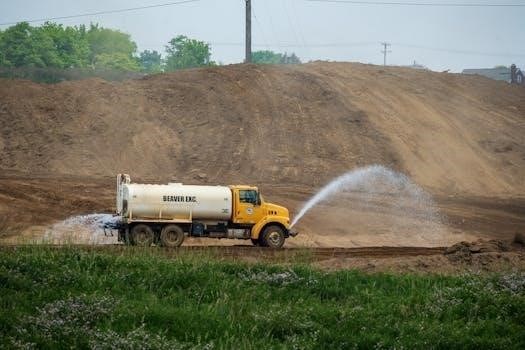Ohio Minor Work Permit⁚ An Overview
In Ohio, minors aged 14 to 17 require a work permit, also known as an Age and Schooling Certificate, to be legally employed. This permit ensures compliance with Ohio labor laws, safeguarding the well-being of young workers.
Who Needs a Work Permit in Ohio?
In Ohio, any minor between the ages of 14 and 17, inclusive, generally needs a work permit to hold a job during the school year. This requirement ensures that the employment of minors complies with state labor laws designed to protect their well-being and educational opportunities. During the summer months, the work permit requirement is slightly different. Only those minors who are under the age of 16 need to obtain a work permit to be employed. This distinction recognizes the difference in school schedules and potential availability of older teens for work during the summer.

Age Requirements and Exceptions
Ohio law mandates work permits for minors, generally those aged 14-17, with some exceptions. The minimum age for employment is typically 14, but specific regulations apply based on age and time of year.
Minimum Age for Employment
In Ohio, the generally accepted minimum age for employment is 14 years old. However, it’s important to note that specific regulations and restrictions apply to minors under the age of 16. These restrictions often involve the type of work they can perform, the number of hours they are permitted to work each day and week, and the times of day they are allowed to work, especially during the school year. Understanding these limitations is crucial for both the minor and the prospective employer to ensure compliance with Ohio labor laws.
Age 14-17 Requirements
For minors aged 14 to 17 in Ohio, obtaining a work permit is mandatory for most employment situations. This requirement is in place to protect young workers and ensure they are not subjected to hazardous conditions or excessive work hours that could interfere with their education. The specific requirements for obtaining a work permit include completing an application form, securing necessary signatures from parents/guardians and potential employers, and providing proof of age. The process also involves adhering to restrictions on work hours, which vary depending on whether school is in session. A new permit is needed for each change of employment;
Summer vs. School Year Permits
In Ohio, the requirements for work permits differ slightly between the summer months and the school year. During the school year, minors aged 14 to 17 are required to have a work permit to hold a job. However, during the summer, only those under the age of 16 need a work permit. This distinction recognizes the reduced demands on a minor’s time and energy when school is not in session. Additionally, the restrictions on work hours are more relaxed during the summer, allowing minors to work longer hours compared to when school is in session. These variations aim to balance work opportunities with educational priorities.

Application Process
To obtain a work permit in Ohio, minors must complete an application, secure employer and parental signatures, and provide required documents. A pre-application form helps gather necessary information efficiently before submitting the final application.
Securing a Job Offer
Before initiating the work permit application, Ohio minors must first secure a bonafide job offer from a prospective employer. This offer should be formalized in a written statement of intent to hire. The employer’s statement must include vital details such as a clear description of the job duties the minor will perform, the agreed-upon work hours per day and week, and the rate of pay or compensation the minor will receive for their work. This document is a prerequisite for the work permit application, underscoring the importance of a confirmed job offer.
Pre-Application Form and Required Information
To begin the work permit process in Ohio, a pre-application form must be completed. This form gathers essential details about the minor, the prospective employer, and the nature of the employment. The minor or student applicant is responsible for filling out their section, providing accurate personal information. Subsequently, the form must be presented to the potential employer, who will then complete their section, including crucial details like the Employer Tax ID. All sections of this pre-application form must be filled out accurately and completely to proceed further in the process.
Parental/Guardian and Employer Signatures
A critical step in obtaining an Ohio minor work permit involves securing signatures from both the minor’s parent or legal guardian and the prospective employer. The parental or guardian signature signifies their consent for the minor to be employed, acknowledging their awareness of the job and its conditions. The employer’s signature confirms their intent to hire the minor, agreeing to comply with Ohio’s minor labor laws, including wage agreements and work hour restrictions. The employer must also indicate the number of hours per week and days the minor will work, including start and end times.
Required Documentation
To secure a work permit in Ohio, minors must provide specific documentation, including proof of age, typically a birth certificate or state-issued ID. Some districts may also require a recent report card.
Proof of Age (Birth Certificate)
One of the crucial documents needed for an Ohio minor work permit is proof of age, most commonly satisfied by presenting an official birth certificate. This document verifies the applicant’s age, ensuring they meet the minimum age requirement of 14 years old for employment, as defined by Ohio labor laws. Some school districts or issuing authorities may accept alternative forms of identification, such as a State of Ohio ID, but a birth certificate is generally the preferred and most widely accepted form of age verification. The document must be original or a certified copy.

Where to Apply
To obtain a work permit in Ohio, minors typically apply through their local school district. Some districts may have designated authorities or offices, such as the superintendent, to issue these permits.
School District or Designated Authority
In Ohio, the primary point of contact for obtaining a minor work permit is usually the student’s school district. The superintendent’s office or a designated authority within the district is responsible for issuing these permits. Students should contact their school guidance counselor or administration office to inquire about the specific procedures and required documentation for applying for a work permit within their district. Some school districts might have specific locations or departments, like the Division of School Choice, where applications must be submitted. It’s essential to verify the specific requirements with the school district.

Work Hour Restrictions
Ohio law sets limits on work hours for minors with permits. Restrictions vary between the school year and summer, ensuring minors balance work with education and well-being.
Daily and Weekly Limits During School Year
During the school year, Ohio places specific restrictions on the number of hours minors can work to protect their education. Minors aged 14 and 15 are typically limited to a maximum of 3 hours on a school day and 18 hours per week. These regulations ensure that their primary focus remains on academics. Restrictions may differ for older minors (16 and 17 years old), but it is important to consult Ohio labor laws and the specific work permit guidelines for complete details. Exceptions may apply for approved vocational or work-study programs.
Daily and Weekly Limits During Summer
During the summer months, when school is not in session, Ohio law allows minors to work more hours. Typically, the daily limit increases to 8 hours, and the weekly limit extends to 40 hours. However, these limits generally apply to minors under the age of 16, as those 16 and older may have fewer restrictions. It is important to verify the specific regulations with the Ohio Department of Commerce or the issuing authority for the work permit to ensure compliance and avoid any potential labor law violations. These regulations are in place to ensure the safety of the minors.
